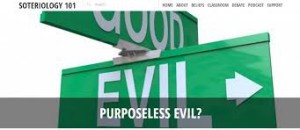Last week we looked at two choices we can make when we have doubts and fears: 1) We can walk through them with God, or 2) we can turn away from God and face them on our own, either way the doubts and fears are still there. We contrasted these choices as they were made by Charles Templeton and Billy Graham and found that if we go the distance with God like Graham did, He will be faithful to sustain us. Templeton on the other hand, walked away from God and in the end said “I miss Jesus.”
One of Templeton’s main objections to God’s existence was the presence of evil in the world. C.S. Lewis became one of the greatest Christian Apologists of the 20th century because, as an atheist, he also cited the problem of evil until he realized that he could only distinguish evil if there was a standard of good to measure it by, so he searched for and discovered who that standard was. Many of our top Christian Apologists today have come from similar journeys. Josh McDowell, Lee Strobel and J. Warner Wallace all began as Atheists but the key, they did not settle there.
The Question of Evil and Suffering: Why does it exist?
This seems to be the number one objection by many who question God’s existence, but after doing a lot of reading on the topic I found that the only worldview that can give concrete historical and spiritual reasons for the presence of evil and suffering is the Christian faith. All of the other worldviews fall short and can really only complain about evil, or pretend that it doesn’t exist.
Dr. Clay Jones, Professor of Christian Apologetics at Biola University, has spent a good portion of his career researching and writing on the problem of evil and suffering. In a recent article he said, “Consider a truth agreed upon by every agnostic, skeptic, atheist, and Christian: only one thing is going to prevent you from watching every person you know die from murder, accident, or disease and that will be your own death by murder, accident or disease.”
In our comfortable western culture we tend to live in denial of evil and suffering including the fact of our own mortality until it hits us personally. When we suffer a tragedy, the loss of a loved one, or a negative prognosis of a disease ourselves only then do we contemplate its significance, only then do we begin to think about eternity. I believe that if we live without a proper perspective of eternity then we will never have a proper understanding of evil and suffering and we may missed the greatest gift of this life that can be found in the promise of Jesus (read the Gospel of John chapter 14).
Sources of evil and suffering:
Satan and his forces cause significant evil, suffering and pain in the world.
To deny a spiritual world is the same as denying that we have souls with immaterial thoughts and intentions (but that is for another post). From the Christian worldview we learn that in the beginning God made everything perfect and “good” (Genesis 1-2) including the spiritual world. However, God chose to give freewill to His creation, freewill is the only way real love can be expressed. Satan, a created being, chose to go against God along with one-third of the created angels (Rev. 12:4, 9) and he was thrown from Heaven to the earth (Job 1; Isaiah 14:12-13). He furthered his choice by deceiving humans (see Genesis 3) and by bringing out the three greatest evil characteristics he possesses in us: Lust of the flesh, lust of the eye, pride of life.
We find him doing this in the Fall when he tempted Adam and Eve:
- Lust of the flesh: The fruit was tempting to the appetite
- Lust of the eyes: The fruit looked good and was attractive
- Pride of life: Satan wanted God’s job and he presented the fruit of the tree as something God was holding back from them and as something they were owed, something they deserved.
What is so awesome is that these are the same three things that Jesus overcame in the wilderness (See Luke 4:1-13):
- Lust of the flesh: Jesus was hungry after 40 days of fasting
- Lust of the eyes: Satan took him to the top of the pinnacle and showed him the world
- Pride of Life: Satan told Jesus he would give him the whole world if He would worship him
How did Jesus avoid these temptations and respond to Satan? HE USED THE SCRIPTURES (GOD’S WORD) and Satan fled.
The Apostle John warned the early Church of these same three things…
- Do not love the world or anything in the world. If anyone loves the world, love for the Father is not in them. For everything in the world—the lust of the flesh, the lust of the eyes and the pride of life—comes not from the Father but from the world. The world and its desires pass away, but whoever does the will of God lives forever. 1 John 2:15-17
How did Satan deceive Adam and Eve and how does he still deceive us?
The first attack of Satan is always on God’s Word.
Step 1: Satan twists God’s Word and causes doubt
“He said to the woman, “Did God really say, ‘You must not eat from any tree in the garden’?” (Gen. 3:1)
- Today Satan causes us to doubt God’s Word by getting us to think it is outdated, written by men and not interpreted correctly; and he causes us to doubt the Bible’s historicity, reliability and inspiration. (All of this is untrue upon careful investigation)
Step 2: Satan contradicts God and substitutes what He said with something else
“You will not certainly die,” the serpent said to the woman. (Gen. 3:4)
- We know that was a lie because Adam and Eve died both physically and spiritually (they were separated from God). Today we find Satan’s deception through changing cultural norms that contradict Biblical values and scientific theories that substitute evolution instead of God as Creator.
Step 3: Satan challenges God’s motives
“For God knows that when you eat from it your eyes will be opened, and you will be like God, knowing good and evil.” (Gen. 3:5)
- In essence Satan was saying that God was holding something important back from them. In today’s culture we have this mind-set that things are owed to us and that God is not giving us what we deserve. I wonder what God thinks we really deserve?
This…
or, because of what Jesus did for us can we have this again…
Join us next week as we look at more answers for the problem of evil and suffering…
You will not find this material in the public school curriculum even though it is based on solid evidence and grounded in research. It is ironic that following the evidence to where it leads stops at the door of our public schools as they will not let a “Divine footprint” in!
Join us this year as we examine evidence for Christianity and learn how to become a thoughtful defender and ambassador of your faith.
Click into the resource page of this website to view many of the top Christian thinkers and apologists along with some of their work; connecting to these types of resources is essential in your Christian growth.
Please let me know what you think: Give feedback, ask questions or send concerns in the comment section of the blog.
Teri Dugan







Sorry, comments are closed for this post.